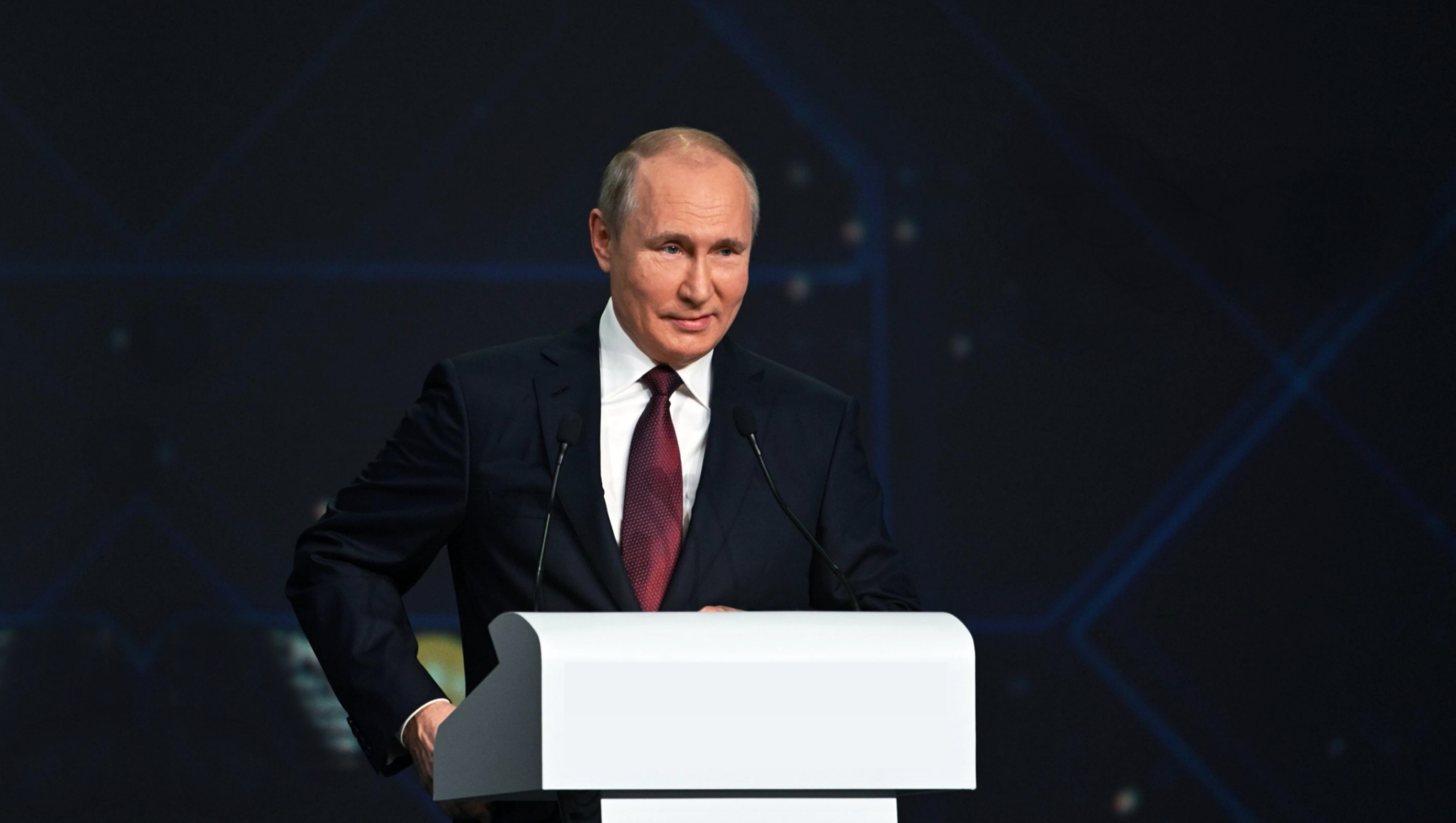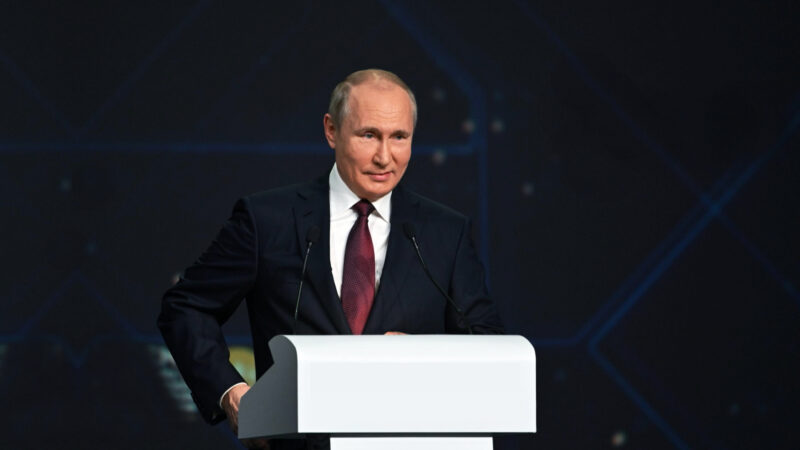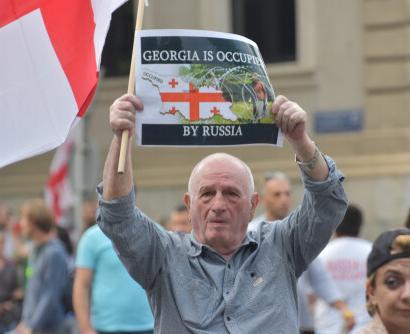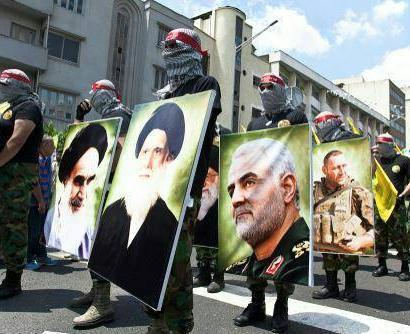Abstract: This article analyses President Putin’s 2021 Valdai speech to clarify the motivations and arguments behind Russian authorities’ strategic decision-making. It briefly focuses on the major pillars of Russian foreign political thinking as presented in the speech under four points: nation state; destructiveness of revolutions; moral and ethical values; and international cooperation. Then, more detailed comments follow each point. The intention is to focus on the deeply rooted conflict-generating factors and the underlying causes of the animosity in the relations between the West and Russia at present.
Bottom-line-up-front: The major problems and dividing lines between the West and Russia are conceptual. The increasingly tense situation around Ukraine, Belarus and other areas along Russia’s border, NATO’s eastward expansion, and Russia’s tough response to it by military build-up – these are all consequences rather than causes of harsh confrontation. The real cause is the irreconcilability between Western states’ modern liberalism, on the one hand, and conservatism adopted by the Russian establishment, on the other. The bottom line of the problem in the West is “rights inflation” as defined by contemporary English thinker Roger Scruton, who believes that broadening the scope of basic human rights has brought about a situation where “rights to one group are denied to another” and “people can now be favoured or condemned on account of their class, race, rank or occupation.”
Problem statement: How to understand narratives and reasoning behind Russia’s strategic decision-making in the context of broader disputes between American liberalism and Russian conservatism?
So what?: The confrontation between the West and Russia has reached a degree when the point of no return from the military option seems to be very near. However, peaceful solutions are still possible, provided that the sides can bridge the gap between their opposite values and adopt a common international agenda, rather than pushing for their own.

Source: shutterstock.com/Luca Perra
The Valdai Speech
President Putin’s speeches at the Valdai Discussion Club’s annual meetings have always been helpful to better understand the strategic directions and issues of high importance for Russia’s foreign political agenda.[1] The 2021 speech and the subsequent lengthy question & answer session[2] was no exception. Moreover, against the backdrop of the increasingly harsh confrontation between the West and Russia, the speech and subsequent answers have shed new light on Russian leadership’s perceptions and assessment of recent international developments.
In his 2021 speech, President Putin covered a plethora of issues ranging from environmental threats to socio-economic problems, from fighting terrorism to local conflicts and post-conflict situations, from overall civilizational crisis to a firm rejection of Western values. It is worthwhile to select and analyze a few of these topics that relate to deeper, strategy-forming conceptual aspects in order to form an understanding of the motivation behind the Russian leadership’s decision-making, without which any constructive dialogue to ease the growing tensions would be meaningless.
The 2021 speech is based on four pillars or points, which together forms the Russian leadership’s political credo. These are: a) the notion of the nation-state as the fundamental unit of international relations; b) the denial of revolutionary developments as a means to solve critical problems accumulated in a given society; c) a eulogy of moral and ethical values that belong, according to some modern currents in the West, to the past; and d) enhanced international cooperation and the necessity of reforming international organizations, primarily the UN. These subjects have constantly occupied the minds of philosophers, thinkers, politicians, political theorists and practitioners all over the world, especially in established democracies.
The 2021 speech is based on four pillars or points, which together forms the Russian leadership’s political credo.
Putin’s position on these issues is all the more important as he is a great power’s leader, whose decisions, especially at this juncture, may have critical importance for the international order.
For the purposes of this article, the author has had recourse to the legacy of contemporary English thinker Roger Scruton, namely, to his book entitled “How to be a Conservative”, an eloquent, inspired, and well-founded advocacy of conservatism. Quotations from Scruton’s book are meant to demonstrate that the Russian president’s arguments are not merely his whim. In general terms, they also are shared by many, mainly conservative circles in the West.
President Putin unequivocally underlined that the major problems and dividing lines between Russia and the West are of conceptual, civilizational character. In other words, the conflicting situations around Ukraine, Belarus and elsewhere are consequences, while the deeply rooted causes lie in diametrically opposite answers to contemporary challenges. These assertions and other conceptual issues are further elaborated in the speech’s “four points.”
Point One – The Nation-State
According to Putin, the nation-state has remained the world order’s structural basis, and the pandemic has affirmed this reality. To underline the fundamental importance of individual nation-states, the Russian president argues that in order to effectively fight the pandemic, the nation-states took individual responsibility and made decisions in conformity with their own national interests.
Another argument is that the assumption that state borders become an anachronism at times of globalization does not stand true. In Putin’s perspective, only national sovereignty can effectively respond to the challenges of the times and the demands of the citizens. Hence, according to Putin: “…. It is impossible to impose anything on anyone, be it the principles underlying the socio-political structure or values that someone, for their own reasons, has called universal”.[3]
Comment
A major argument favouring the nation-state is the notion of shared identity. Indeed, the strength and development prospects of any state, interstate or global international structure lie in its faculty having a common identity based on shared values. It is clear that the level when shared identity can be established and nurtured is the level of the nation-state. Common territory, language, religion, socio-economic, environmental conditions, and, finally, culture are bedrocks upon which a nation can identify its priorities and contribute to the progress of humankind. Here, it would be appropriate to refer to Roger Scruton, who underlines: “Opposition, disagreement, the free expression of dissent and the rule of compromise all presuppose a shared identity. There has to be a first-person plural, a ‘we’, if the many individuals are to stay together, accepting each other’s opinion and desires, regardless of disagreements.”[4]
In that context, the example of the United States of America is inspiring. “We The People” – that is how its constitution starts, indicating to the existence of a common identity, common values of freedom and patriotism that are able to unite people with different backgrounds, cultures and religions under the same flag. American history is an eloquent witness to this. For almost two and a half centuries, this first-person plural has helped America to overcome significant historical challenges both internally and externally, and should this superpower be doomed to decline, the reason would be the tarnishing of the pronoun “WE”.
Indeed, in our times, globalization, and migration, mutual penetration of cultural identities, not least through social networks and other means of communication, may seriously jeopardize the integrity of the nation-state. Multiculturalism is the first sign of this phenomenon. In theory, multiculturalism – respect for and preservation of cultural, ethnic, religious particularities of minority groups – seems to be a lofty idea worthy of being implemented in real life. However, in practice, it may well lead to the creation of two or more parallel cultures, diametrically opposite principles and perceptions and, in some instances, even flagrant breach of legislation. This, in turn, may seriously destabilize the nation-state by establishing parallel societies that move in opposite directions. As Roger Scruton rightly points out when speaking of Western societies “…. communities can be absorbed and integrated into our way of life, even when they arrive bearing strange gods. But this virtue of our civilization, so clearly manifest in America, has been used precisely to repudiate that civilization’s claim on us, to argue, in the name of multiculturalism, that we need to marginalize our inherited customs and beliefs, even to cast them off, in order to become an ‘inclusive’ society in which all our newcomers feel at home, regardless to any effort to adapt to their new surroundings.”[5]
Scruton observes, and I agree, that communities formed as a result of migration do not absorb, as a rule, the host country’s culture, but remain foreign to its identity. Indeed, freedom of expression, religion, and the right to form associations are the sacrosanct principles of human rights. However, instead of preserving an ethnic minority’s cultural identity, multiculturalism, in reality, has turned out capable of leading to isolation or ghettoization of entire ethnic groups or ethnic minorities. This might endanger, and the examples are abundant, has already endangered security and stability of those peoples whose governments have adopted such a policy.
Indeed, freedom of expression, religion, the right to form associations are the sacrosanct principles of human rights. However, instead of preserving an ethnic minority’s cultural identity, multiculturalism, in reality, led to isolation or ghettoization of entire ethnic groups or ethnic minorities.
In the context of Scruton and Putin’s assertions, France may represent a glaring example. An article in New York Post points out that “Muslim ghettos in Paris and Brussels are incubators of Islamic extremism, where police fear to tread, crime and unemployment are rampant and radical imams aggressively recruit young men to wage jihad against the West”.[6] Combating Islamic radicalization has become a major item on the France’s political agenda. The 2015 deadly terrorist attacks in Paris, then in 2016 in Nice triggered heated debates among the society on how to face the increasingly dangerous challenges to secularism, elucidation, democracy and “what makes us who we are”, in other words, French national identity.[7]
In his 02 October 2020 speech in Les Mureaux, outside Paris, President Macron defined “Islamist separatism” as a major security threat. He emphasized that: “A conscious, theorized, political-religious project is materializing through repeated deviations from the Republic’s values, which is often reflected by the formation of a counter-society (highlight added)as shown by children being taken out of school, the development of separate community sporting and cultural activities serving as a pretext for teaching principles that aren’t in accordance with the Republic’s laws. It’s indoctrination and, through this, the negation of our principles, gender equality and human dignity.“[8]
That “the formation of a counter-society” has increasingly been jeopardizing French identity is a fact that is more and more difficult to deny even for “multiculturalists”. To provide a fresh example, one should refer to the events in Roubaix, described by the French presidential candidate Éric Zemmour as “Afghanistan at a two-hour driving distance from Paris.”[9] After a broadcast on the alarming rise of radical Islamists in France, in particular, in Roubaix, the Islamist forces issued death threats to the broadcast’s presenter Ophélie Meunier and participant, lawyer Amine Elbahi. They are now placed under police protection along with other journalists who dared to utter a word in defence of French cultural identity.
What is more, as the lawyer of Charlie Hebdo, Richard Malka, who himself is under police protection, underlined: “Soon it will be impossible to report on Islam, fanaticism and fundamentalism.”[10] That’s because political correctness should be observed at any rate, and it doesn’t matter if the situation degenerates further.
Several other European countries face similar challenges. Whether their plans of action and determination to combat “Islamist separatism” will yield any tangible results is a big question mark.
Point Two – Destructiveness of Revolutions
In this section of the Valdai speech, Putin’s main argument is that revolutions are not a way to settle a crisis but aggravate it. At this point Putin referred to the history of Russia, which during the 20th century alone witnessed two major revolutionary shocks. They were triggered by brutal changes of the political system with, respectively, the collapse of the monarchy in 1917 and communism in 1991. Putin concluded that: “No revolution was worth the damage it does to human potential.”[11]
Comment
At first sight, Putin seems to be absolutely right when stating that no revolution is worth its damage to human potential. Notable examples of this damage would include the terror perpetrated by the French Revolution, hardships, suffering and millions of broken destinies triggered by the 1917 October revolution, and the painful disintegration of the Soviet Union followed by anarchy and plundering of the popular assets by a handful of oligarchs and establishment of kakistocracy in Russia and almost all former Soviet Republics.
All these phenomena would seem enough to advocate for an evolutionary way of political developments instead of revolutions that are always associated with violence and atrocity – except that sometimes history develops in a way that inevitably leads to revolutionary solutions, as with wars. Revolutions and wars are the most horrible and appalling things that may ever occur. However, they cannot be eradicated: a conflict of interests and state egoism can always reach such an irreversible level of hatred (internally, in case of revolutions, and externally in case of wars) that brutal force and violence remain the only available means to solve a harsh confrontation.
Revolutions and wars are the most horrible and appalling things that may ever occur. However, they cannot be eradicated: a conflict of interests and state egoism can always reach such an irreversible level of hatred that brutal force and violence remain the only available means to solve a harsh confrontation.
There is another allusion in Putin’s criticism of revolutions: the wave of the so-called “colour revolutions”, successful or unsuccessful, that took place along the border of Russia. The list is quite impressive: Georgia (2003), Ukraine (2004 and 2014), Kyrgyzstan (2005 and 2010), Armenia (2008 and 2018) and Belarus (2020).
Traditionally, the Russian establishment and analytical community have given credence to conspiracy theories. They have interpreted the above-mentioned popular unrest solely as a result of substantial financial infusions and technical assistance by the West to local revolutionaries. From the official Russian viewpoint the “colour revolutions” have aimed to transform Russia into a Western-style country by bringing pro-Western forces to power. While external factors can undoubtedly play a rather significant role in this kind of development, one should not ignore that a major trigger of “colour revolutions” has been popular indignation and hatred accumulated by decades of authorities’ demagogy about the triumph of democracy, rule of law and justice. Let’s take into account systematically falsified elections, in particular in the bulk of post-Soviet countries, which deprive people of their proclaimed right to free and fair elections. We will understand what the Universal Declaration of Human Rights meant by stating in the Preamble: “Whereas it is essential, if man is not to be compelled to have recourse, as a last resort, to rebellion against tyranny and oppression (highlight added), that human rights should be protected by the rule of law, …’.[12]
There is nothing accidental in the Declaration, and its statement stems from centuries of reflections by great philosophers and political thinkers, and most importantly, human experience that convincingly argued for people’s right to revolution against tyranny and oppression as a last resort.
In light of this argument, Putin’s assertion that: “Revolutions are not a way to settle a crisis, but a way to aggravate it” sounds somewhat disputable. They are a way to settle a crisis. That is why, actually, they occur.
Point Three – Moral and Ethical Values
This is, perhaps, Putin’s central argument. It stems from the Russian president’s profound conviction that: “The importance of a solid support in the sphere of morals, ethics and values is increasing dramatically in the modern fragile world.”[13] He criticizes “attempts to force one’s values on others”, “aggressive elimination of entire pages from [the West’s] history”, “reverse discrimination” against the majority in the interests of a minority, and the demand to give up the traditional notions of mother, father, family and even gender…”.
Against the backdrop of these modern trends that are very distinctive in Western societies, Putin’s fundamental principle is that of “healthy conservatism” which in his interpretation is not “about an ignorant traditionalism, a fear of change or a restraining game”, but primarily means “reliance on a time-tested tradition, the preservation and growth of population, a realistic assessment of oneself and others…. And a fundamental rejection of extremism as a method”. It should be reiterated that Putin has several times repeated that the Western countries could adopt any values whatsoever, but they should not, on the other hand, try to impose them on other nations.
Comment
Putin’s point dealing with moral and ethical values is the most controversial and complicated one. His starting point is that: “Any attempt to force one’s values on others …. can only further complicate a dramatic situation and usually produce the opposite reaction and the opposite from the intended result.” One cannot but agree with this argument. Suffice to remember what happened to the so-called “communist camp” formed after World War II under the hegemony of the Soviet Union. Communist ideology was imposed on several East European peoples but remained alien to them. As a result, the communist block and its military wing, the Warsaw Pact, collapsed like a colossus with feet of clay.
Communist ideology was imposed on several East European peoples but remained alien to them. As a result, the communist block and its military wing, the Warsaw Pact, collapsed like a colossus with feet of clay.
The same has been happening to the modern liberal ideology’s similar attempts. The American obsession with imposing liberal values in the wake of invasions of Afghanistan and Iraq could only lead to loss of human lives, suffering and wasting trillions of dollars just to end up with a total collapse.
The Russian president’s appeal to the West is not to export liberal values, but to foster them internally if they are determined to continue in that vein. In that context, the Russian president stresses that: “…. The social and cultural shocks that are taking place in the United States and Western Europe are none of our business; we are keeping out of this”, while expressing, at the same time, amazement at the processes underway in those countries “which have been traditionally looked at as the standard-bearers of progress”.
What are the social and cultural shocks that Putin refers to “with amazement”? His major targets are “aggressive revision by the West of its own history, elimination of entire pages from it, and rejection of traditional family values”. He believes that: “The fight for equality and against discrimination has turned into aggressive dogmatism bordering on absurdity when the works of the great authors of the past – such as Shakespeare – are no longer taught at schools and universities because their ideas are believed to be backward.”
Another point is that: “Countering acts of racism is a necessary and noble cause, but the new “cancel culture” has turned it into “reverse discrimination” that is, reverse racism.” Finally, Putin underlines that: “… the debate over men’s and women’s rights has turned into a perfect phantasmagoria.”
For sure, modern European liberals and leftist politicians will scornfully reject all these arguments, most probably ascribing them to Putin’s and, in general, the Russian authorities’ obscurantism, backwardness, let alone aggressive intentions vis-à-vis the Occident.
Here again, one should refer to Roger Scruton and his arguments in favour of conservatism. Together with him, we should briefly touch upon fundamental issues to better understand Putin’s views – not necessarily to justify the latter’s opinion but rather to grasp the perfidious nature of dangers that have already seriously jeopardized the integrity of Western identity.
The bottom line is that the modern liberals attempt to artificially introduce new alien elements into the internationally acknowledged framework of human rights and fundamental freedoms. In other words, as Scruton has perspicaciously formulated: “… egalitarians have begun to insert more positive rights into the list of negative freedoms, supplementing the liberty rights specified by various international conventions with rights that do not merely demand non-encroachment from others, but which impose on them a positive duty”.[14]
The liberals intend to broaden the scope of fundamental freedoms, which are considered basic exactly because they are few. As Scruton has put it, what we witness in the West at present is “rights inflation”. What we witness is: “new ideas of human rights” that “allow rights to one group that they deny to another: you have rights as a member of some ethnic minority or social class that cannot be claimed by every citizen. People can now be favoured or condemned on account of their class, race, rank or occupation, and this is in the name of liberal values.”[15]
The liberals intend to broaden the scope of fundamental freedoms, which are considered basic exactly because they are few.
The obvious outcome of this is the “cancel culture” that has become an idée fixe in many left-wing intellectual circles, whose fanaticism, akin to that of medieval witch hunters, does not recognize any limits in their fight against the values enshrined in the works of great European humanists. “Beethoven doesn’t deserve to be cancelled”. This phrase picked up from Twitter at random is a convincing example of intellectual and spiritual misery that the proponents of “cancel culture” suffer from.
As Roger Scruton has underlined: “Everything that does not conform to the egalitarian goal must be pulled down and built again, and the mere fact that some custom or institution has been handed down and accepted is no argument in its favour. In this way ‘social justice’ becomes a barely concealed demand for the ‘clean sweep’ of history that the revolutionaries have always attempted.”[16]
“Clean sweep” of history… Just as in the left-wing anthem – L’Internationale: “Du passé faisons table rase” (Of the past let us wipe the slate clean). The consequences of this kind of fanaticism are well known: human suffering, calamities, mutual hatred and devastating wars. The question is whether or not it would be possible to avoid relapsing into the same tragic scenario.
The only way to tackle this growing problem is to preserve and enhance one’s identity. It is also the best way to respect the identity of others, to share universal values that can bridge the gap between different religions, cultures, and ethnicities. As Roger Scruton has underlined: “From Orlando Furioso and Don Quixote to Byron’s Don Juan, from Monteverdi’s L’Incoronazione di Poppeia to Longfellow’s Hiawatha, from The Winter’s Tale to Madama Butterfly and Das Lied von der Erde, Western culture has continuously ventured into spiritual territory that has no place in the Christian map. Those great aesthetic achievements …. enable men and women to identify in imagination with those from ‘elsewhere’.”[17]
Point Four – International Cooperation
The Russian president strongly advocates for enhancing international cooperation, given the existence of several global challenges that no state would be able to meet alone. Putin’s conceptual approach is that it is impossible to solve the global challenges by creating global supranational structures and transferring states’ sovereign rights. The way ahead, in his opinion, should be international cooperation based on finding common grounds of interaction that would correspond to the interests of each separately taken state or member of the international community.
In this context, Putin proposes to “draw up, at the UN level, a list of challenges and threats that specific countries face with details of how they could affect other countries.” The expectation is that this kind of exercise could mobilize analysts and practitioners from different countries to elaborate common grounds for facing global challenges, which in turn would strengthen mutual understanding and cooperation.
All in all, Putin highly appreciates the UN as a structure that “brings a touch of reasonable conservatism into international relations, something that is so important for normalizing the situation”. He also suggests that reforming or dissolving some international institutions should be considered as highly important on the international community’s agenda, without, however, specifying the content of the proposed reforms or which institutions should be abolished.
Comment
Putin’s major argument in this section of his speech is that “resolving many urgent problems the world has been facing would be impossible without close international cooperation”. On the other hand, he opines that global solutions to global problems will never become a reality because states and peoples will never accept transferring their sovereign rights to supranational institutions.
This same logic suggests that a vicious circle threatens humanity: in order to face global problems, there is a need to act globally through supranational structures, but nation-states will never agree to create these structures just for the sake of not losing their sovereignty.
In order to face global problems, there is a need to act globally through supranational structures, but nation-states will never agree to create these structures just for the sake of not losing their sovereignty.
Is there an exit from such a deadlock? The Russian president hopes that this could be possible, “… if everyone saw a benefit from cooperation in overcoming those challenges.” In other words, even if creating supranational institutions does not seem realistic, international cooperation still can take place through the existing international organizations and regional arrangements, provided that nation-states unite their efforts in meeting tremendous challenges and clearly realize that such cooperation could benefit their national interests.
This seems to be a convincing argument, all the more so that the United Nations’ member-states have created sound bases of international cooperation. They have elaborated, sometimes over decades, and adopted fundamental documents that contain the necessary criteria, standards and tools to unite the international community’s efforts in fighting serious threats to international peace and security and securing peoples’ decent lives free of violence and penury.
However, for successful cooperation, be it in the framework of the UN or regional organizations, such as the OSCE, their member-states must overstep their separate interests and ambitions and work in the interests of the common good. In other words, an international organization should not be a mere gathering of nation-states but a framework to guide and unite their efforts in conformity with the fundamental documents and solemn declarations signed and proclaimed by these states.
What we can see nowadays is quite the opposite. The member-states of current-day institutions try to use the platform of international organizations to push for their own and like-minded member states’ interests ignoring their commitments and the spirit, norms and code of conduct of the organizations.
The member-states of current-day institutions try to use the platform of international organizations to push for their own and like-minded member states’ interests ignoring their commitments and the spirit, norms and code of conduct of the organizations.
The split of the Security Council, which often paralyzes the UN decision-making, the OSCE’s near loss of its conflict prevention and resolution potential due to systematic confrontation of its participating states along dividing lines between the West and Russia, may testify to the incapability of nation-states to harmonize their interests around a common agenda.
Quite recently, the 2021 OSCE Ministerial Council in Stockholm adopted only two substantive decisions out of approximately 25 drafts submitted for negotiation.[18] Stefanie Lichtenstein, an analyst specialized in OSCE matters, provides in Security and Human Rights Monitor a major reason for such a deplorable situation. She underlines: “Several OSCE diplomats also told SHR Monitor that Sweden over-emphasized its own foreign policy goals, pushing for gender equality and language on women’s rights to be added to almost every draft ministerial decision while being fully aware that this would be met by immediate opposition of countries such as Russia or the Holy See.”[19]
The failure was due to the fact that Sweden as a nation-state (and OSCE Chairpersonship country for 2021) pushed its own foreign political agenda in line with feminist foreign policy instead of trying to prepare the common ground for adopting important political decisions. If a Chairperson-in-Office, whose responsibility is to establish common goals and guide the participating states toward their implementation, demonstrates such behaviour, what to expect from the others?
Close to the Point of No Return
At the time of writing, the confrontation between the West and Russia has reached a degree where the point of no return from the military option is very near. While political/diplomatic efforts may still temporarily defuse tensions, they cannot solve the deeply rooted causes of the confrontation. What is going on is not only about NATO’s expansion or the probability of Russia’s imminent invasion of Ukraine. Instead, the conflict-generating factor since the early 2000s, when Putin came to power, is the protagonists’ diametrically opposite perceptions and mentality due to the irreconcilability between modern liberalism and conservatism. The Russian president’s 2021 Valdai speech once again exposed this reality.
While political/diplomatic efforts may still temporarily defuse tensions, they cannot solve the deeply rooted causes of the confrontation. What is going on is not only about NATO’s expansion or the probability of Russia’s imminent invasion of Ukraine.
The West has embarked on broadening the scope of basic human rights, and authoritarianism has been enlarging its realm in Russia and several former Soviet countries. These opposite trends are developing unabated and, if not reversed, sooner or later, will lead to open confrontation.
It may not be possible to find a peaceful solution unless the sides can reach a common understanding based on the narrow bridge of human rights and fundamental freedoms as enshrined in the UN relevant documents and adopt a common international agenda rather than pushing for their own.
Dr Vahram Abadjian is an independent international affairs analyst. Previously he has been involved with UN peacekeeping operations and UNDP, as well as OSCE, EU and NGOs in MENA, the Sahel, the Balkans, Central Asia and East Europe. His research interests include international peace and security, conflict prevention and resolution, democratization, development, and dialogue of civilizations. Dr Abadjian has authored analytical articles, most recently on the critical developments in Armenia and Belarus. The views contained in this article are the author’s alone and do not represent the views of The Defence Horizon Journal.
[1] A Russian think tank founded in 2004 by the Moscow State Institute of International Relations. Its annual meetings gather academics, researchers and practitioners to discuss the most topical problems of international politics.
[2] “Valdai Discussion Club Meeting,” Official site of the President of Russia, retrieved on December 22, 2021, http://en.kremlin.ru/events/president/news/66975.
[3] Ibid.
[4] Roger Scruton, “How to be a Conservative” (Bloomsbury Continuum, new edition: London, 2019), 33.
[5] Roger Scruton, “How to be a Conservative,” 82.
[6] Jamie Schram and Bob Fredericks, Muslim ghettos in Europe are breeding grounds for terror, New York Post, March 22 2016, retrieved on February 2, 2022, https://nypost.com/2016/03/22/muslim-ghettos-in-europe-are-hotbeds-for-terror/.
[7] Anina Schwarzenbach, Fighting the “Threat from within”: France and Its Counter-Radicalization Strategy, in De-Radicalization in the Mediterranean – Comparing Challenges and Approaches, edited by Lorenzo Vidino, ISPI, 2018, 26.
[8] Emmanuel Macron, Speech in Les Mureaux, October 2, 2020, Official website of the President of France, retrieved on February 6, 2022, https://www.elysee.fr/en/emmanuel-macron/2020/10/02/fight-against-separatism-the-republic-in-action-speech-by-emmanuel-macron-president-of-the-republic-on-the-fight-against-separatism.
[9] Jürg Altwegg, Von Islamisten mit dem Tod bedroht, Frankfurter Allgemeine, February 5, 2022, last accessed February 22, 2022, https://www.faz.net/aktuell/feuilleton/medien/islamisten-bedrohen-journalistin-und-zeugen-des-senders-m6-mit-dem-tod-17780110.html
[10] Idem.
[11] Valdai Discussion Club Meeting,” Official site of the President of Russia, retrieved on February 6, 2022, http://en.kremlin.ru/events/president/news/66975.
[12] “Universal Declaration of Human Rights,” United Nations, edition of 2015, 1, https://www.un.org/en/udhrbook/pdf/udhr_booklet_en_web.pdf.
[13] Valdai Discussion Club Meeting,” Official site of the President of Russia, retrieved on February 6, 2022, http://en.kremlin.ru/events/president/news/66975.
[14] Roger Scruton, “How to be a Conservative,” 70.
[15] Roger Scruton, “How to be a Conservative,” 73-74.
[16] Roger Scruton, “Fools, Fraudsand Firebrands” (Bloomsbury Continuum, new edition: London, 2019), 4.
[17] Roger Scruton, “How to be a Conservative,” 88.
[18] Stephanie Liechtenstein, Sweden’s OSCE Chairpersonship: ‚Tactical mistakes’ amid tense geopolitical situation and ongoing pandemic, Security and Human Rights Monitor, December 21, 2021, retrieved on December 22, 2021, https://www.shrmonitor.org/swedens-osce-chairpersonship-tactical-mistakes-amid-tense-geopolitical-situation-and-ongoing-pandemic/.
[19] Idem.






